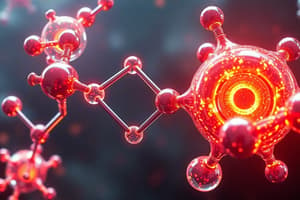Podcast
Questions and Answers
Which property is unique to carbon among the elements?
Which property is unique to carbon among the elements?
- Existence in multiple allotropes
- State of being a solid at room temperature
- Ability to form multiple covalent bonds (correct)
- Presence in all living organisms
Which carbon allotrope is characterized by being a hollow, spherical molecule?
Which carbon allotrope is characterized by being a hollow, spherical molecule?
- Fullerene (correct)
- Diamond
- Graphite
- Isomer
What type of bonds do organic compounds mainly contain?
What type of bonds do organic compounds mainly contain?
- Metallic bonds
- Covalent bonds (correct)
- Hydrogen bonds
- Ionic bonds
Which type of compound belongs to the group of organic molecules?
Which type of compound belongs to the group of organic molecules?
What is the primary focus of organic chemistry?
What is the primary focus of organic chemistry?
Which of the following is NOT an organic molecule?
Which of the following is NOT an organic molecule?
What is the primary goal of organic synthesis?
What is the primary goal of organic synthesis?
Which of the following techniques is NOT a common method used in organic synthesis?
Which of the following techniques is NOT a common method used in organic synthesis?
What is the main principle behind synthetic strategies in organic chemistry?
What is the main principle behind synthetic strategies in organic chemistry?
Which of the following organic reactions involves the addition of a nucleophile to a carbonyl double bond?
Which of the following organic reactions involves the addition of a nucleophile to a carbonyl double bond?
What is the main benefit of studying organic chemistry?
What is the main benefit of studying organic chemistry?
Which of the following is NOT a common organic reaction?
Which of the following is NOT a common organic reaction?
Flashcards are hidden until you start studying
Study Notes
CHM 102: Organic Chemistry
Organic chemistry is a subtopic within the broader field of chemistry. It is the study of carbon-containing compounds and their properties, reactions, and synthesis methods. Organic chemistry is a fundamental part of CHM 102, which is an introductory chemistry course designed to provide students with a foundational understanding of the subject.
Introduction to Organic Chemistry
Organic chemistry is concerned with the chemistry of carbon-containing compounds, which form the basis of all living organisms. Carbon is unique among elements because of its ability to form multiple covalent bonds, and the resulting molecular complexity and versatility. Organic compounds are characterized by the presence of carbon-carbon bonds and the absence of free metallic bonds.
Carbon Allotropes
Carbon is the only element to exhibit allotropy, meaning it can form many different types of molecules with the same element. The three main forms of carbon are diamond, graphite, and fullerene. Diamond is a stiff, crystalline solid, graphite is a soft, slippery solid, and fullerene is a hollow, spherical molecule made of carbon atoms.
Organic Molecules
Organic molecules are those that contain carbon and can be synthesized and modified by chemists. They are essential for the study of chemistry and are found in all living organisms. Organic molecules include hydrocarbons, alcohols, ethers, aldehydes, ketones, carboxylic acids, amines, and amides.
Organic Synthesis
Organic synthesis is the process of creating organic compounds from simpler precursors. It is a crucial aspect of organic chemistry research and drug development. The goal is to develop efficient and selective methods to produce the desired organic molecule in high yield and purity.
Synthesis Techniques
Organic synthesis employs various techniques, including:
- Addition reactions: Addition of a molecule to a double or triple bond to form a new bond.
- Substitution reactions: Replacement of one functional group by another on the same carbon atom.
- Elimination reactions: Removal of two atoms or groups from a molecule, leaving a double or triple bond.
- Rearrangement reactions: Shifting of atoms within a molecule to form a new compound.
Synthetic Strategies
Synthetic strategies are the methods used to plan and execute the synthesis of complex organic molecules. These strategies are based on the principles of retrosynthetic analysis, which involves working backwards from the desired target molecule to identify the simplest possible precursors.
Organic Reactions
Organic reactions are chemical processes that involve organic compounds. They are crucial for understanding the properties and behavior of organic molecules. Some common organic reactions include:
- Nucleophilic addition: Addition of a nucleophile to a carbonyl double bond, forming a new carbon-carbon bond.
- Elimination reactions: Removal of two atoms or groups from a molecule, leaving a double or triple bond.
- Substitution reactions: Replacement of one functional group by another on the same carbon atom.
- Rearrangement reactions: Shifting of atoms within a molecule to form a new compound.
Conclusion
Organic chemistry is a fundamental subtopic within CHM 102, providing students with a comprehensive understanding of the synthesis, properties, and reactions of carbon-containing compounds. It is essential for the study of chemistry and is the basis for many applications in various scientific fields and industries. Organic chemistry continues to be a fascinating area of study, with ongoing research and advancements in synthetic methods and applications.
Studying That Suits You
Use AI to generate personalized quizzes and flashcards to suit your learning preferences.




